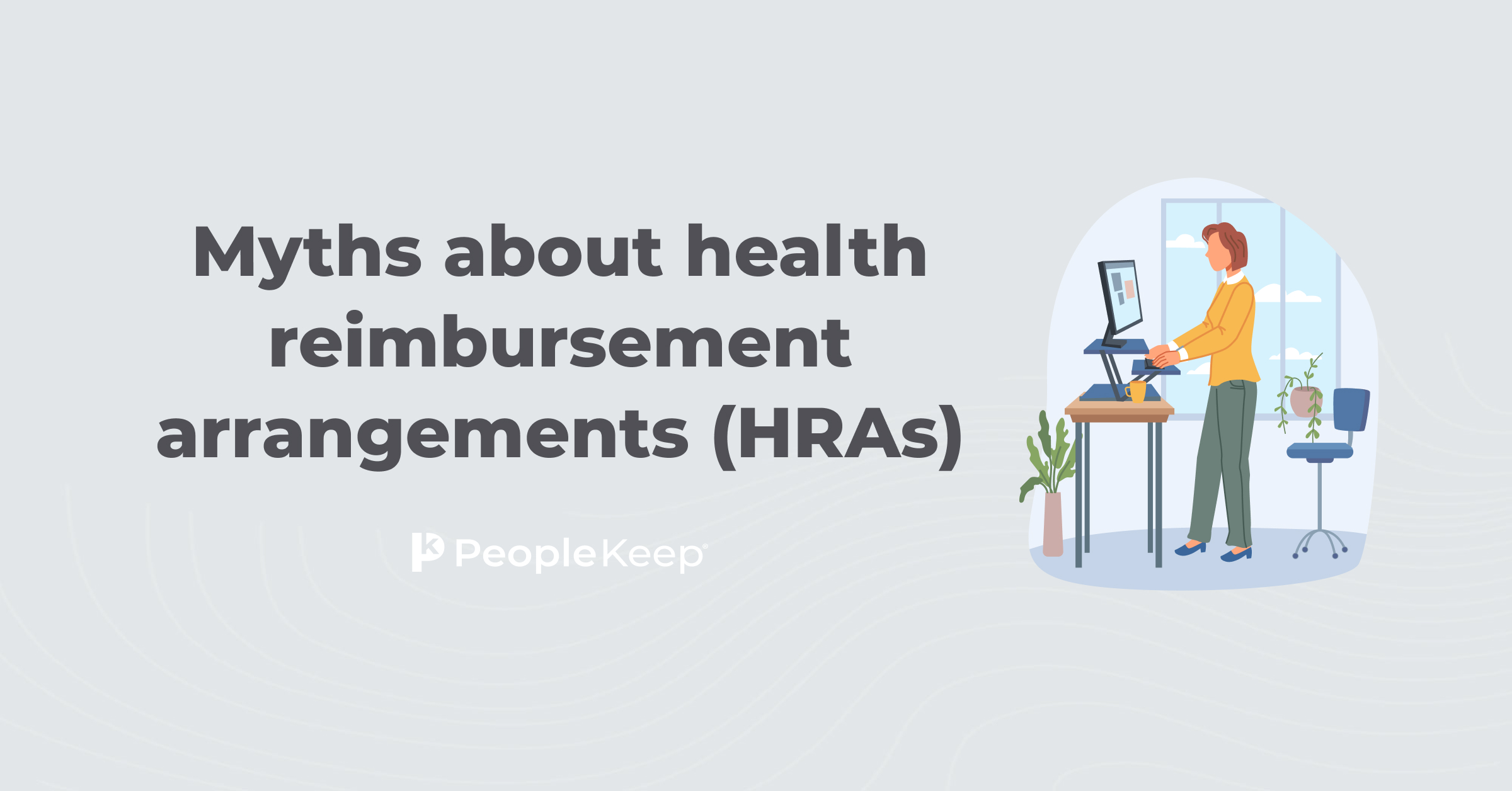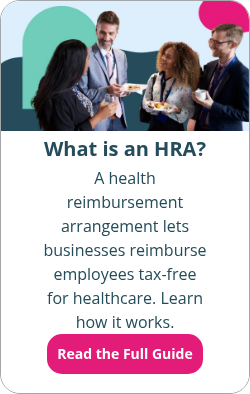What are health insurance rewards programs, and how do they impact HRAs?
By Holly Bengfort on March 24, 2025 at 1:30 PM
A recent Talker Research survey found that 60% of Americans rate their holistic health as average. Many participants are looking to eat healthier, age well, and improve digestion1. With 90% of individuals setting a health-related goal, incentives are one way to stay on track.
Health insurance rewards programs incentivize consumers to take a more active role in managing their health and wellness. But how do they work? And how do they impact employee benefits, like health reimbursement arrangements (HRAs)? Our article will walk you through the process.
In this blog post, you’ll learn:
- How health insurance rewards programs work and the well-being incentives they offer.
- The benefits of health insurance rewards programs for employers and employees.
- How these well-being programs work with HRAs and premium reimbursements.
What are health insurance rewards programs?
Health insurance rewards programs motivate policyholders to adopt healthy habits. This concept is like workplace wellness programs, which reward employees for health improvement activities.
These programs promote healthy behaviors for members, such as:
- Eating well
- Staying active
- Achieving health goals
- Scheduling annual checkups
- Completing preventive screenings.
When insurance policyholders take part in health-related activities, they receive various rewards. Prizes can include reduced monthly premiums, gift cards, or points members can redeem to buy items from the insurer's online store.
Here are some common incentives health insurers offer for positive, healthy behavior changes:
- Someone who attends a smoking cessation class receives a $25 prepaid debit card.
- Members can earn a $50 gift card if they see their primary care doctor for an annual wellness screening.
- Policyholders receive a $50 e-gift card after they complete a personal health assessment on their insurer’s secure portal.
- Anyone who receives a flu shot during flu season gets a $10 cash reward.
- Members who complete a biometric screening receive a $25 prepaid card.
- Policyholders can earn up to $100 annually by hitting their daily step goals after syncing a step tracker with their insurance company's mobile app.
- Eligible individuals who lower their blood pressure receive discounts on wellness-related resources. These can include meal plans, gym memberships, and weight management programs.
Each type of health insurance rewards program has unique awards, activities, and restrictions.
How do health insurance rewards programs benefit policyholders?
People who participate in health incentive plans reap several benefits. By meeting health-related goals, members can reduce their healthcare costs and improve their well-being. Earning incentives also encourages people to take active participation in managing their health. This can lead to better long-term health status.
For example, a policyholder can take active steps to quit smoking or lose weight. If they work to achieve that health-related goal, their insurer will reward them through the incentive program. Plus, they'll improve their quality of life by quitting an unhealthy behavior in the process.
For some people, all it takes to make a change is motivation. A health insurance rewards program gives many individuals the push they need to take steps toward a healthy lifestyle.
How do health insurance rewards programs benefit employers?
Employers who choose to offer health insurance rewards programs also have advantages. First, health insurance companies offer them at no additional cost. These programs help reduce medical expenses by motivating employees to be more proactive with their healthcare. When employees take better care of themselves now, they can prevent serious chronic diseases such as stroke, cancer, and diabetes in the future.
Employers can also reduce absenteeism and improve productivity by encouraging employees to adopt healthy behaviors. Workers who feel healthy and strong are less likely to take frequent sick days. Plus, it's easier for employees to focus at work with less stress over finances and health issues.
Offering health incentive plans can also help employers attract and retain top talent. A MetLife study found that 52% of workers say health and wellness programs are a must-have employee benefit3. Study results also showed that healthy employees are 74% more likely to have job satisfaction.
What insurance companies offer health insurance rewards programs?
Health insurance rewards programs are relatively new to individual plans on the Affordable Care Act (ACA) marketplaces. But they’re becoming more popular.
More insurance carriers are offering these programs to keep members healthy. When more individuals in the rating pool do healthy activities, healthcare costs are lower. These programs also help health insurance companies keep existing customers happy and engaged while they draw in new ones.
Below are five insurance companies that provide wellness reward programs for healthy behaviors as of 20252:
- Ambetter/Centene
- Cigna
- Molina
- Oscar
- UnitedHealthcare
The above insurance carriers are large organizations that serve several states. But, many smaller insurers also offer health incentive plans.
So, how do you know if an insurance company has one so you can start reaping the benefits? A broker can help you find plans that have wellness incentive programs. You can also contact the insurers by phone or browse their websites.
How do health incentive programs impact HRAs?
HRAs are employer-funded health benefits that reimburse employees tax-free for their qualified medical expenses. Employers set a monthly allowance amount that works for their budget. Then, employees choose the right healthcare services and items for them. When employees submit qualified expenses, their employer reimburses them up to their allowance.
Integrated HRAs only work with group health insurance plans, helping employees pay for out-of-pocket costs the plan doesn’t fully cover. Stand-alone HRAs reimburse employees for their individual health insurance premiums and medical expenses.
One financial incentive a health insurance rewards program may offer is a discount on monthly insurance premiums. Employees who receive a reduced medical premium must adjust their HRA premium reimbursement requests to exclude the discounted amount.
If you use PeopleKeep’s HRA administration software, you can easily make this change. If you saved your monthly premiums in our software, you can edit your reimbursement requests at the bottom of your employee dashboard. You can do this for the months your insurer discounted their premium amount.
Conclusion
Health insurance incentive programs are a wise choice for those looking to establish healthier habits. They benefit members by lowering healthcare costs and promoting better health outcomes. Some well-being programs integrate with individual health insurance. Therefore, they can impact your HRA reimbursements. But paired together, you can better control your health and finances.
Are you an employer looking to strengthen your health benefits? PeopleKeep by Remodel Health can help! Book a call with an HRA specialist, and we’ll ensure your benefit package supports your employees' healthcare goals.
This blog article was originally published on June 7, 2023. It was last updated on March 24, 2025.
1. Talker Research Survey on Health Trends in 2025
2. ACA Wellness Plans That Offer Wellness Incentives
3. MetLife's Annual U.S. Employee Benefit Trends Survey 2022
Check out more resources
See these related articles

Myths about health reimbursement arrangements (HRAs)
Learn the truth about health reimbursement arrangements (HRAs) with this informative guide. Bust the myths and understand how HRAs can benefit you.

Guide to premium tax credits for health insurance
See how premium tax credits can lower health insurance costs. Our guide provides the information you need to navigate this important aspect of healthcare.

Health insurance reimbursements: What are the options?
Explore your options for health insurance reimbursement. Understand what insurance reimbursement means and how HRAs can support employees.



